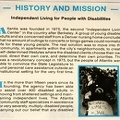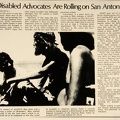MAinstream magazine [No date]
[This story continues in ADAPT 222, but is contained here in its entirety for reading ease.]
[Headline] ADAPT takes the fast lane to make transit accessible
By Michael Ervin
San Antonio—The first indication that something was about to happen came when an oversized, stretch-limo of a van pulled up beside the Alamo and a wheelchair lift uncurled out of the back door. The colorful banner on the side of the van read: ACCESS FOR ALL.
Six more people in wheelchairs were in another van parked in a lot down the street. As they proceeded down the sidewalk to join the demonstration in front of the Alamo the pedestrians stopped and looked them over. A parade of people in wheelchairs is bound to draw stares. But the expressions accompanying these stares were unique—welcoming, supportive, somewhat star struck.
Maybe they knew they were coming. Before the 50 or so members of various chapters of American Disabled for Accessible Public Transit even arrived here there were stories in the media about previous ADAPT confrontations with the American Public Transit Association (APTA.) Television news showed footage of the mass arrests that occurred last October in Washington, D.C. when ADAPT members tried to force their way into the center where APTA was holding its annual convention.
That's the kind of escalating media coverage Wade Blank likes to see. He’s the main force behind ADAPT. “We're becoming famous. When we had our first ADAPT meeting in Denver in 1982, our goal was to make the officials of any city we were coming to nervous. We wanted them to say, ‘No! Not here! We don’t want ‘em!’”
They were certainly nervous in San Antonio. When a horde of people in wheelchairs showed up at the offices of the local transit authority for a noisy demonstration, the employees locked themselves in a large office as if they were afraid ADAPT was going to take them out one by one and shoot them. And when the march that began at the Alamo turned into an equally raucous occupation of the lobby of the posh hotel where APTA people were staying, hotel security had no idea what to do. And the bewildered looks of the innocent tourists were amusing. They’d certainly never seen anything like that before.
“Seeing a bunch of disabled crazies blocking buses and doing things like that redefines everything everybody’s been conditioned to believe about the disabled," Blank says.
This radical redefinition of what the disabled are (in the eyes of both the disabled and nondisabled) is what ADAPT is all about. And having stuffy APTA conferences and conventions as a backdrop helps make that point. APTA’s primary sin, according to ADAPT, is that it spent big bucks on a lawsuit that struck down the federal mandate that all fixed-route public buses be lift-equipped. ADAPT sees equal transit access as the most basic civil right. “It's the same segregation as when blacks had to sit in the back of the bus or yield their seats to whites. Except it’s even worse,” says Blank. “The disabled can’t even get on the bus.”
By using APTA as a symbol of the stifling paternalism that keeps the disabled in a position of dependency, ADAPT makes the immorality of inaccessible public transit quite clear.
***
Wade Blank is an ordained minister who never goes to church. “It’s in the true Jesus tradition. He was kicked out of the synagogue and never went back.”
Blank worked in a nursing home for a few years after seminary. It frustrated him to see the disabled friends he made there stuck there simply because they had no place else to go.
So in 1976 he and some others began Atlantis, an independent living center in Denver. ADAPT was born of Atlantis.
Blank says Atlantis likes to “do the impossible” in terms of working with clients who have the deepest holes of dependency to dig out of. Frank, a man with cerebral palsy who was part of the ADAPT Denver caravan to San Antonio, was sprung by Atlantis in 1976 from a nursing home he had been in since 1934. Another woman began feeding herself for the first time when she became part of Atlantis. She was always physically able to. Her mother just didn't want her making a mess. Another woman had never seen a head of lettuce. Her salads had always come to her prepared.
It’s rather stunning seeing people who were mired in the world of please and thank you traveling around the country, blocking buses and maybe getting arrested. It’s gotten ADAPT and Atlantis in trouble with irate relatives. The father of a woman arrested for blocking buses in Denver told Wade that since he was a reverend he must be brainwashing his daughter into joining his cult, just like Jim Jones. He said he was going to tell the newspapers so they could investigate.
But Blank says, “All we’re saying to people in Atlantis and ADAPT is, ‘You are an important person.’ I just tell them (the irate relatives) that people get excited when they see that they are important and that they are expected to be somebody.”
In 1978, it became clear that the mission of Atlantis could never be fully accomplished as long as Denver’s public transit system was totally inaccessible. What good was it to set someone up in an accessible apartment if they couldn’t move beyond it? They might as well have still been in the nursing home.
So the Atlantis people took to the streets of Denver. They blocked buses. They held sit-ins in the transit authority offices. They got arrested. But four years later, they won and Denver is on its way to full access.
[Bordered text box in center of page: “We created a drama and let it unfold . . .I guess we raised consciousness.”]
The next year, APTA made the mistake of holding its convention in Denver. The target was too tempting for Atlantis to resist. Here was the personification of everything Atlantis opposed right on its step and begging to be hit. Atlantis formed a permanent transportation component call ADAPT. They organized confrontations around the convention and vowed to follow APTA everywhere until it passed ADAPT ’s resolution renouncing the lawsuit and the damage it did. These confrontations would also provide a focal point and a training ground for activists from other cities so they could form their own ADAPT chapters.
Mike Auberger of Atlantis is a quadriplegic resulting from a bobsled accident during the 1972 Olympic time trials. “When we started ADAPT, we were a bunch of crazy nuts. A year later, we were a possibility. Now, we’re a reality. We started in one city and here we are about 20 cities. We must be selling something everybody needs.”
The hope is that the feeling of self-importance that inspired the disabled of Denver will be as infectious in San Antonio and in cities all over America. ADAPT paved the way in San Antonio by creating a three-day headache for the police and transit authority and forcing them to take the issue very seriously. They also permanently etched the issue on the minds of the people of San Antonio with pictures on the front page of the newspaper of disabled people blocking APTA tour buses.
“We created a drama and let it unfold,” Blank says. “I was talking to a reporter and I said, ‘I guess we raised consciousness.’ She said, ‘Boy did you! That’s all this town is talking about.’ ” “Now you can’t say that about too many political movements today.”
But even if it doesn’t play in San Antonio, Auberger sees what happened there as another battle won. “Again we took on APTA and beat them. You’ve got this guy in a $300 suit and a designer tie with his initials and a soup stain on it. More and more people are starting to see APTA
that way.”
If success can be judged by police reaction, ADAPT is accomplishing a lot. Knowing ADAPT ’s penchant for blocking buses, the police routed buses away from areas with high ratios of wheelchair-users. They obviously did their homework by talking to police in other cities who had to deal with ADAPT. A television news report even told of how San Antonio police intelligence photographers were following ADAPT members
around.
And it’s clear that transit authorities are taking ADAPT very seriously too. The next target is Los Angeles, where APTA will hold its convention in October. ADAPT has obtained a copy of a private memo of the Southern California Rapid Transit District that speaks of the authority’s plans to spend $10,000 to $15,000 to “handle vast numbers of wheelchair bound people” who will be coming to town. “While confrontations cannot be stopped, they can be blunted.” It speaks of how the RTD is “searching for ways to diffuse or ward off demonstrations,” perhaps by pacifying everyone for a few days with a conference on accessible transit [ibid]. “Can we take control by creating a hospitality center for the handicapped?” the memo says.
Who can resist such an opportunity. ADAPT is on its way.
- Created on
- Thursday 11 July 2013
- Posted on
- Friday 8 January 2016
- Tags
- ADAPT - American Disabled for Accessible Public Transit, Alamo, APTA - American Public Transit Association, arrested, Atlantis, blocking buses, caravan, center for independent living, civil rights, consciousness raising, convention, Denver, dependency, Frank McColm, inaccessible, lawsuit, media, Mike Auberger, Mike Ervin, minister, New Orleans, nursing homes, occupy, paternalism, police photographer, protesters, public transit, radicals, San Antonio, sit-in, transit authorities, vans, VIA offices, Wade Blank, Washington DC, wheelchair lifts
- Visits
- 6200
- Rating score
- no rate
- Rate this photo


0 comments